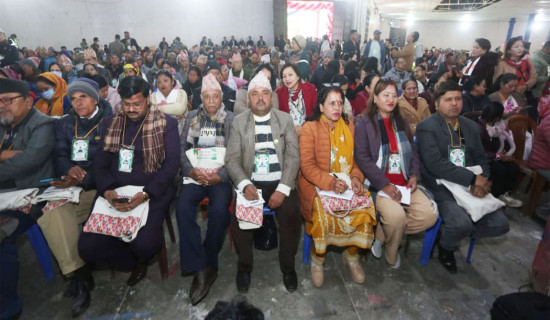- Monday, 12 January 2026
PM Oli’s China Visit
As Prime Minister KP Sharma Oli is gearing up to embark on his official visit to China from December 2-5, we believe that rigorous homework has been done to ensure that the visit will live up to its expectations in serving the national interests in ways that would be mutually beneficial. Needless to say, China has become enviably successful in transforming itself into an economic superpower and infrastructural juggernaut over the course of last five decades. Adding another feather in its cap, it became the biggest car exporter in the world in 2023, surpassing Japan, propelled by the rise of its home-grown electric vehicle (EV) makers – a position it is likely to hold for many years.
What's more, China has achieved stunning growth in its installed renewable energy capacity over the last two decades, far outpacing the rest of the world. As part of its climate actions, China has been adding renewable energy (mainly from solar and wind) to its national grid more than the rest of the world combined, becoming the global leader. What is even more impressive is China's sincere keenness to share its miraculous development with developing countries and be their reliable partner as they navigate their journey out of poverty and chronic underdevelopment.
Taking this eagerness as a tremendous opportunity and capitalising on it can well turn out to be one of our most significant steps in our journey towards graduating from the Least Developed Country (LDC) status by 2026. During the upcoming visit, the agenda should focus on key areas that align with Nepal's national interests, long-term development goals, and the evolving geopolitical landscape. First, Chinese automakers are willing to expand their manufacturing base; and given the explosive growth of Chinese-made EVs in Nepal, inviting them to manufacture such vehicles here would be a win-win situation. The visit of the Prime Minister should be leveraged as a necessary groundwork to this end.
Second is energy cooperation. China can help us in our efforts to wean ourselves off fossil fuel, as it has the unmatched expertise in the development and installation of renewable energy, including hydropower. As untapped hydropower potential in Nepal is significantly high, the two countries can forge joint ventures to exploit this potential. In the context that Nepal is finding newer international buyers of its electricity, there's no doubt that this partnership will pay off handsomely. Third is the strengthening economic cooperation. The visiting PM should push for clarity and mutually beneficial implementation of BRI projects in Nepal in a way that emphasises transparency, sustainability, and Nepal's pressing economic needs.
Fourth is trade balance. Addressing Nepal's trade deficit with China by seeking increased market access for Nepali products, particularly agricultural goods and handicrafts, should also be high on agenda. Fifth is investment and technology transfer. This can be done by encouraging Chinese investment in Nepal's industrial sector, emphasising green energy, IT, and tourism. Sixth is infrastructure development. No country is nowhere near China when it comes to infrastructural development. From ports to roads to railways to airports to many other critical infrastructures that underpin economies of many countries from South America to Asia, China's expertise and experience in building mammoth structure is indeed unparalleled.
By prioritising these areas, Prime Minister Oli can strengthen Nepal-China relations while ensuring tangible benefits for Nepal's development and prosperity. The Prime Minister has already made it clear that no loan agreement will be signed with the northern neighbour during this visit. This view has come out after consultations with other political parties, especially the ruling coalition partner Nepali Congress. Positions of political parties may differ on some issues but when it comes to abiding by the foreign policy and putting national interest on top, there needs to be a common ground. A balanced and friendly relation with neighbours is our motto. This will be the guiding principle for the official China visit of the Prime Minister. In this regard, there should be no ambiguity on the part of any political force of the country.










-(1)-original-thumb.jpg)






